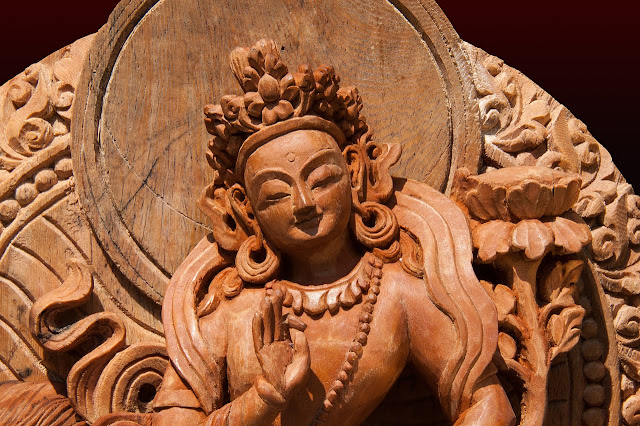Welcome to an interactive blog where we embark on a captivating journey into the world of spiritual leaders in Tibetan Buddhism. Throughout this exploration, you will discover the profound teachings, the enlightened figures, and the invaluable guidance they provide to their followers. Get ready to dive deep into the heart of Tibetan Buddhism and actively engage in this immersive experience!
1. Connect with Your Inner Compassion
Compassion lies at the core of Tibetan Buddhism. Take a moment to reflect on your own capacity for compassion. How do you define compassion? How can you cultivate compassion in your daily life? Share your thoughts in the comments below and let's start this journey with an open heart.
2. Discover the Dalai Lama's Wisdom
The Dalai Lama, an icon of Tibetan Buddhism, radiates wisdom and compassion. Dive into his teachings by exploring his books, interviews, and talks. Select a quote or teaching that resonates with you, and share it with us. How does it inspire you and how can you apply it to your life?
The Dalai Lama's wisdom emphasizes the importance of cultivating compassion, both towards oneself and others. He reminds us that true happiness and fulfillment arise from genuine care and concern for the well-being of all beings, transcending boundaries of race, religion, or nationality. His teachings encourage us to look beyond our self-centered concerns and extend a helping hand to those in need, fostering a sense of unity and interconnection among all human beings.
Furthermore, the Dalai Lama's wisdom emphasizes the cultivation of inner peace and contentment. He encourages practices such as mindfulness and meditation, which enable individuals to cultivate a calm and focused mind, free from the turbulence of negative emotions. Through these practices, he guides us towards a deeper understanding of our own minds and the realization that true happiness comes from within.
The Dalai Lama's wisdom also encompasses the power of forgiveness, tolerance, and dialogue in fostering harmony and resolving conflicts. He advocates for the importance of finding nonviolent solutions to conflicts and encourages the cultivation of understanding and empathy in our interactions with others.
Ultimately, the Dalai Lama's wisdom teaches us that compassion, wisdom, and inner peace are not abstract ideals but practical qualities that can be cultivated in our daily lives. By embracing his teachings, we can transform our relationships, our communities, and the world at large, creating a more compassionate, harmonious, and interconnected global society.
3. Unravel the Mystery of the Panchen Lama
In 1995, at the age of six, Gedhun Choekyi Nyima was recognized by the 14th Dalai Lama as the 11th Panchen Lama. Shortly after his recognition, he and his family were reportedly taken into custody by the Chinese government, and their whereabouts have remained undisclosed ever since. The Chinese government then installed another boy, Gyancain Norbu, as the Panchen Lama recognized by the Chinese authorities.
The situation surrounding the Panchen Lama highlights the challenges faced by Tibetan Buddhism under Chinese rule. The Chinese government's interference in the recognition process raises concerns about religious freedom and autonomy within Tibetan Buddhist traditions. The lack of information about Gedhun Choekyi Nyima's well-being and the denial of access to him raises questions about his spiritual education and development.
The mystery of the Panchen Lama poses a dilemma for Tibetan Buddhists and the international community. Many Tibetan Buddhists consider Gedhun Choekyi Nyima as the true incarnation of the Panchen Lama, while others recognize the boy appointed by the Chinese government. This division underscores the complexities and tensions between religious authority and political control.
As we unravel the mystery of the Panchen Lama, it is essential to advocate for the protection of religious freedom and the preservation of Tibetan Buddhist traditions. By raising awareness, engaging in dialogue, and supporting organizations and initiatives that work towards promoting religious freedom, we can contribute to creating a climate that respects the autonomy and spiritual integrity of Tibetan Buddhism.
4. The Sakya Trizin's Teachings
The Sakya Trizin is the leader of the Sakya school of Tibetan Buddhism, known for its rich lineage. Explore the teachings of the Sakya Trizin and find a particular teaching or practice that resonates with you. How can you incorporate it into your spiritual journey?
Central to the Sakya Trizin's teachings is the integration of wisdom and compassion. He emphasizes the cultivation of insight through the study of Buddhist philosophy, empowering individuals to develop a clear understanding of the nature of reality. By engaging in rigorous study and contemplation, practitioners gain the tools to discern the true nature of their own minds and the world around them.
Compassion, a core pillar of Tibetan Buddhism, is a focal point of the Sakya Trizin's teachings. He inspires practitioners to cultivate a deep sense of empathy and care for all beings, recognizing that true happiness arises from acts of selfless kindness and compassion. Through various practices, such as meditation on loving-kindness and compassion, the Sakya Trizin guides individuals towards the realization of the interconnectedness of all life and the importance of alleviating suffering in the world.
The Sakya Trizin also emphasizes the practical application of Buddhist teachings in everyday life. His teachings provide guidance on navigating the challenges and complexities of the modern world while maintaining a strong spiritual foundation. He encourages practitioners to integrate the wisdom gained from their studies and meditative practices into their interactions, relationships, and responsibilities, promoting harmony, ethical conduct, and genuine happiness.
Furthermore, the Sakya Trizin places great importance on lineage and the transmission of teachings from teacher to student. He serves as a living link to the wisdom of previous generations and ensures the preservation of the Sakya tradition. Through personal example, oral transmission, and direct instruction, he imparts the sacred teachings to his disciples, nurturing a strong connection to the lineage and inspiring a deep commitment to the practice.
5. Unveiling the Karmapa's Wisdom
The Karmapa, a revered figure in Tibetan Buddhism, embodies the compassionate activity of the Buddhas. Discover the wisdom of the Karmapa by exploring his writings, teachings, and projects. Choose one aspect that captures your attention and discuss how it relates to the challenges of the modern world. How can we integrate ancient wisdom into our daily lives?
Compassion is a central theme in the Karmapa's teachings. He highlights the transformative power of compassion in addressing the suffering of individuals and society as a whole. The Karmapa encourages practitioners to extend their care and concern beyond their immediate circle, embracing all beings with a genuine sense of empathy and love. He emphasizes that compassionate action is not limited to grand gestures but can be manifested through small acts of kindness and understanding in everyday life.
In addition to meditation and compassion, the Karmapa's teachings also address the urgent environmental challenges facing our world. Recognizing the interdependence between humanity and nature, he advocates for ecological stewardship and emphasizes the importance of mindful and sustainable living. The Karmapa's teachings inspire individuals to develop a deep sense of responsibility towards the environment, fostering a harmonious relationship with the natural world.
The Karmapa's wisdom is not confined to traditional teachings alone. He skillfully integrates ancient wisdom with contemporary issues, addressing the concerns and dilemmas faced by people in today's fast-paced and interconnected world. His teachings provide practical guidance on navigating the complexities of modern life while remaining rooted in spiritual principles.
Furthermore, the Karmapa's personal example of humility, integrity, and compassion serves as an inspiration to practitioners worldwide. His embodiment of wisdom and compassion encourages individuals to aspire to higher spiritual ideals and motivates them to make positive changes in their lives and in society.
Conclusion
Congratulations on completing this interactive journey into the realm of spiritual leaders in Tibetan Buddhism! By actively engaging in the exploration of teachings, wisdom, and the challenges faced by Tibetan Buddhism, you have deepened your understanding and connected with fellow seekers. Remember to carry the insights gained into your own spiritual practice, as we strive to cultivate compassion, wisdom, and harmony in our lives and the world around us.
Feel free to continue the discussion in the comments section, sharing your reflections, questions, and experiences. Together, let us create a space of learning, growth, and interconnectedness. May the teachings of Tibetan Buddhism inspire and guide us on our spiritual paths.










.jpg)




0 comments:
Post a Comment